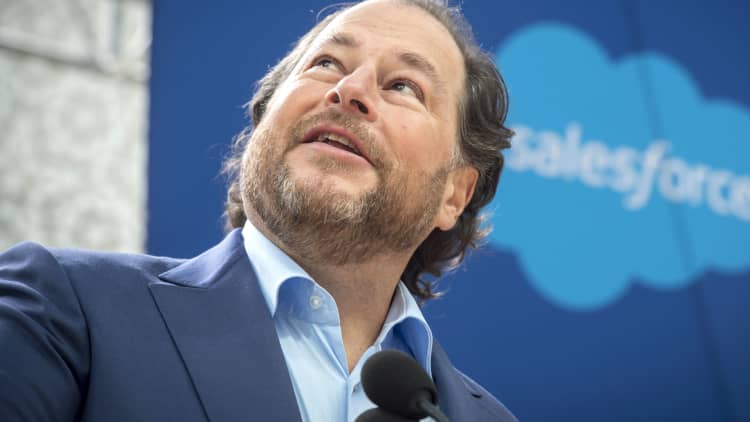
The Dow is making some dramatic changes.
S&P Dow Jones Indices said Monday that the 30-stock average would be adding Salesforce, Amgen and Honeywell in place of Exxon Mobil, Pfizer and Raytheon Technologies, one of its biggest shake-ups in years.
Howard Silverblatt, senior index analyst of product management at S&P Dow Jones Indices, said his company's decision was wrapped up in Apple's 4-for-1 stock split, which significantly reduced the Dow's exposure to the technology sector:
"It reflects the market. ... Basically, Apple by itself, forgetting the three changes, took the technology group within the Dow from 27.6% down to 20.3, a significant decline. We use that as an additional item in making adjustments. By adding Salesforce, you come back to about 23.1% of the Dow being in technology. The other changes also reflected more what the market is doing, especially United Technologies, [which] when they did the spin-offs became Raytheon, so, the adding of Honeywell more in this field and, of course, Amgen as compared to Pfizer, which is more current at this point in time. … It's extremely unusual, the amount of changes. I mean, we've had three, four historical changes in the Dow, but this is a massive amount, especially when you added Apple, which re-weights it significantly. So, we expect to see a lot of action on it, a lot of buying and selling and definitely we'll have a lot of performers out there showing the new and old makeups of that. Again, technology still is going down from 27.6[%] … to 23.1, which is a significant change, and health care also picks up from 14.2 to 18.6. So, there's a lot of variance in there compared to what the prior Dow makeup was."
Tim Seymour, founder and chief investment officer of Seymour Asset Management and a regular on CNBC's "Fast Money," said the 124-year-old index was "scrambling ... to be more representative of where the market is":
"We at times are critical of a price-weighted index for moments like this, and/or should Salesforce be a bigger play? Who knows? But I think the significance here is that you have to be representative. And we talk about how European indices, especially the DAX, underperform, and no matter what, they're going to underperform because they have no technology and they have no mega-cap tech plays. So, I think the Dow is very aware of this and there are dynamics at work. I think Exxon out of the Dow is a historic day and it really tells you and it punctuates what's happened to the energy sector."
Jeremy Siegel, the Russell E. Palmer professor of finance at the University of Pennsylvania's Wharton School, said the Dow newcomers would likely benefit from the move:
"Despite the fact that the Dow has lagged the S&P certainly over the last year, over the last 20, 30 and 40 years, the Dow total return has actually beat the S&P 500. So, I'm not going to question the people on that committee that chooses those Dow 30. They've done a darned good job over the years. … We all know that the amount of money that is indexed to [the] Dow is very much smaller than that to the S&P 500. So, there are going to be some inflows, to be sure, but it's really small. But in terms of just name recognition and getting into that elite group of 30, [the] Dow is the oldest continuously computed index, stock index, in the world. I mean ... it became 30 stocks in 1926. That's almost a century ago. So, certainly, it has a history, a reputation. Getting in there is very likely to have some positive effect on your company."






